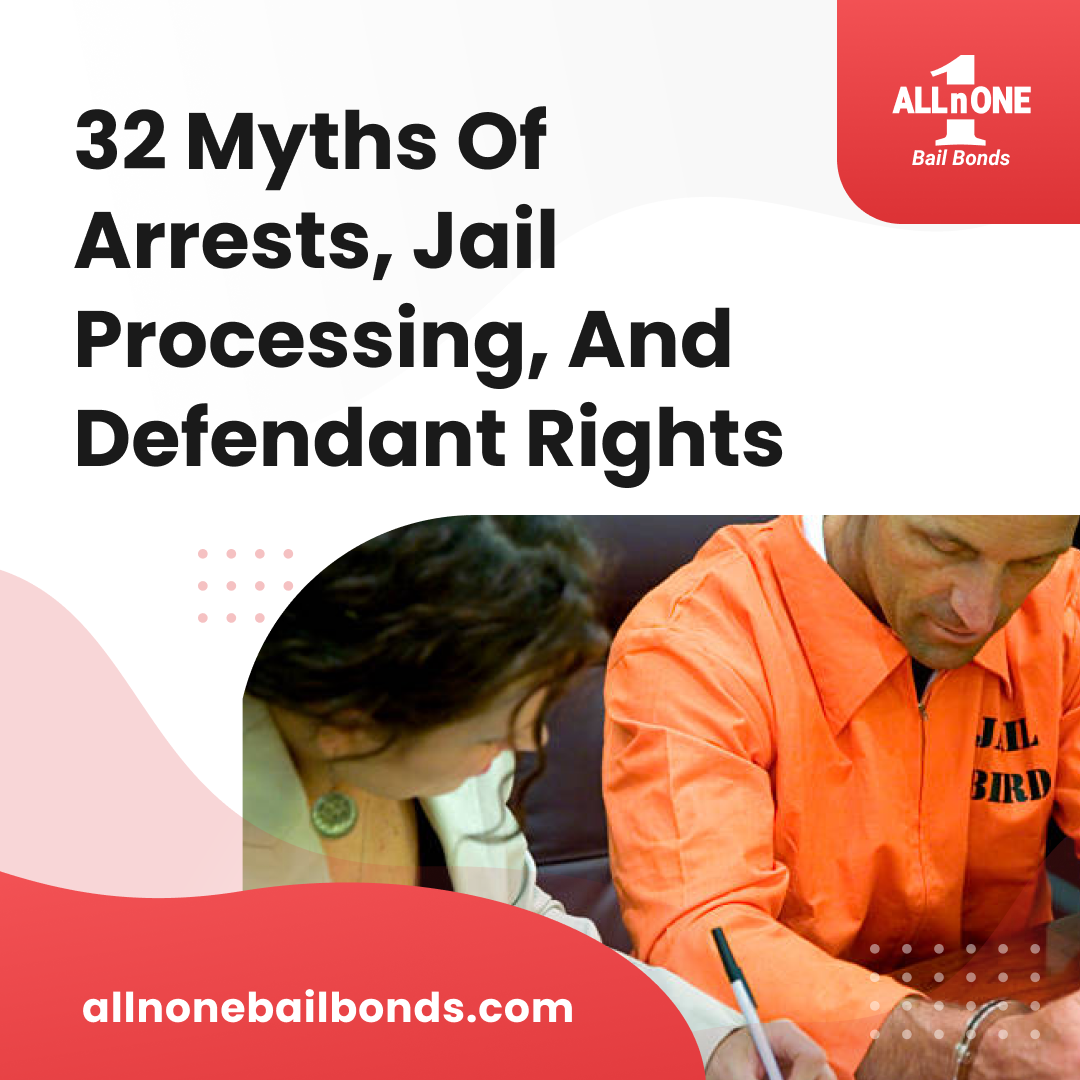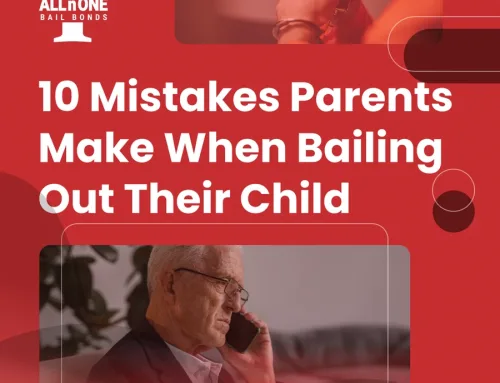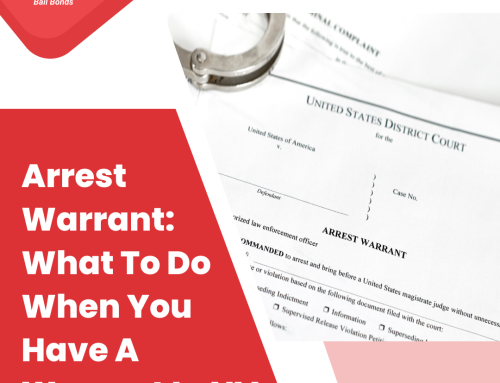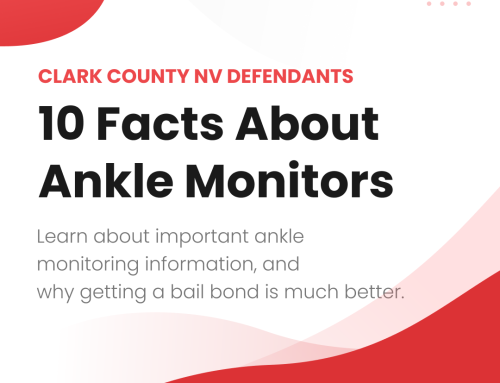Today, several myths surround the subject of arrests, jail processing, and defendant rights in Nevada, largely because of dramatic depictions on TV and in movies.
We’re posting this list to clear up misconceptions and provide accurate information based on our experience working with clients who need bail bonds. This information is intended to help individuals better understand their rights and navigate the bail bond process more effectively.
Keep reading to learn more!
Disclaimer: Nevada may have more current or accurate information. We make no warranties or guarantees about the accuracy, completeness, or adequacy of the information contained in this post. Please refer to official sources. The information in this post is not a substitute for professional legal advice.
Arrest Myths
Myth 1: Police Must Read You Your Miranda Rights Immediately Upon Arrest
Reality: Imagine you’re in a situation with the police, and you get put in handcuffs. Your first thought might be, “Aren’t they supposed to read me my rights?” Well, the reality is that officers are only required to read your Miranda rights before conducting an interrogation, not at the moment of arrest.
The police are obligated to give you the Miranda warning when they intend to interrogate you while you’re in custody. The warning is tied to questioning, not the moment they put on the cuffs. This means that if the police arrest you but don’t plan on interrogating you, they don’t have to read you your rights immediately.
The Purpose of Miranda Rights
The law is set up this way because Miranda rights are there to inform you of the Fifth Amendment, which protects against self-incrimination, and the Sixth Amendment, which offers the right to legal counsel.
The Miranda warning verbatim is: “You have the right to remain silent. Anything you say can and will be used against you in a court of law. You have the right to an attorney. If you cannot afford an attorney, one will be appointed for you. Do you understand the rights I have just read to you?”
Note: The exact wording of the Miranda warning can vary slightly, but the core elements remain the same.
Exceptions to The Miranda Rule
Exceptions to the Miranda requirement do exist. For example, if a person with a weapon presents a clear danger to the public, police can ask where the weapon is located without reading the Miranda rights.
Just as importantly, voluntary statements made by the suspect can be used in court. If you start talking to the police without them asking you questions, your statements can be admitted as evidence against you, even if your rights have not been read.
Myth 2: Your Case Will Be Dismissed if the Police Did Not Read Your Miranda Rights
Reality: While it’s true that a failure to read your Miranda rights could be a violation of your constitutional rights, it doesn’t automatically mean your case will disappear.
The consequences of a Miranda violation depend on a whole host of factors, including the evidence against you and the legal arguments your attorney makes. It’s not a simple equation of “no Miranda = no case.”
This misunderstanding is largely a result of pop culture. We’ve all heard the phrase “You have the right to remain silent” countless times on TV and in movies. It’s become so ingrained in our culture that it’s easy to assume that if a police officer fails to read you your rights, your case will be thrown out automatically. But the truth is much more nuanced and sometimes uglier.
Myth 3: Explaining to Police Will Resolve the Issue
Reality: While the US Constitution protects suspects from self-incrimination and ensures their right to legal counsel, many people believe if they explain their side of the story to the police, they might get let go or receive reduced charges.
This is a bad idea and a trap, one that is very easy to fall into. It’s natural to want to explain yourself when faced with accusations or questioning by law enforcement. However, engaging in conversation with law enforcement can inadvertently lead to self-incrimination or contradictory statements that weaken your defense!
Explaining the situation to the police is often the worst thing you can do, as anything you say can be used against you in court. While you should certainly cooperate with the police, exercising your right to remain silent and seeking legal representation is the wisest choice.
Myth 4: You Have a Constitutional Right to a Phone Call Immediately After Arrest
Reality: Although you have the right to communicate with legal counsel and family members, the specifics of when and how to make phone calls vary. It all depends on the jurisdiction and the situation, as there is no constitutional guarantee of an immediate phone call upon arrest.
With that said, in most cases, if the arrested individual remains cooperative and respectful, they may be allowed to retrieve a few numbers from their phone while they’re being processed in.
In a situation with a hostile arrest, injury to an officer, or other major issues, phone calls may be restricted until after the suspect’s initial court appearance. Furthermore, in situations involving serial crimes, it is not uncommon for suspects to be held without communication for a certain period.
Note: If a person expects to remain in custody for an extended period, it is advisable to write down important phone numbers, as access to personal cell phones stored in the property room will be limited. Also, when making a phone call, we advise exercising caution, as your call may be recorded.
Myth 5: Police Cannot Lie
Reality: Law enforcement officers can and do use deception as an investigative technique. In fact, it’s legal for them to lie to obtain information during investigations in most states.
This is due to a decision the U.S. Supreme Court made back in 1969 in the case of Frazier v. Cupp. In a nutshell, the case gave police the green light to use deception during interrogations. The Court determined that misleading a suspect, in and of itself, does not violate a suspect’s constitutional rights.
The ruling opened the door for law enforcement to get creative when trying to get information out of suspects. They might bluff and say they’ve got hard evidence against the suspect, like fingerprints, witness statements, and confessions.
Fortunately, at least, there are limitations to this practice. For instance, any confession or admission obtained through deception must still be voluntary and not the result of coercion. If the police cross the line and start using coercion or threats, there may be grounds to challenge the admissibility of the statements in court.
Myth 6: If You’re Innocent, You Don’t Need A Lawyer
Reality: Some people believe that if they haven’t done anything wrong, they don’t need a lawyer. They assume that their innocence will be obvious and that the truth will naturally come to light.
However, the prosecution’s job is to prove guilt, not to uncover the truth. They may interpret evidence in a way that supports their case, even if there are alternative explanations.
Without a skilled defense attorney to challenge their arguments and present your side of the story, you will find yourself at a disadvantage.
Jail Processing Myths
Myth 7: Jail is Only for the Guilty
Reality: When you think of jail, you might assume everyone in there is a hardened criminal. But jails hold a mix of individuals, including many of those who are awaiting trial and haven’t been convicted yet.
Pretrial detainees will be in jail for a variety of reasons. Some may not be able to afford bail, and others may be deemed a flight risk or a danger to the community. Some may be awaiting transfer to another facility or jurisdiction.
In fact, pretrial detainees make up a significant portion of the jail population in the United States. According to Prison Policy Initiative, most people in jail are legally innocent.
Myth 8: Posting Bail Means You’re Admitting Guilt
Reality: This is a misconception that can keep people from seeking the help of a bail bond company. In reality, posting bail is not an admission of guilt whatsoever. It’s simply a way to secure your release from jail while you wait for court.
It’s a promise to show up, not a confession of wrongdoing. A competent bail bond agent understands this and won’t judge you based on the charges against you. They’re there to support you.
Myth 9: Bail Bond Companies Only Deal with Criminals
Reality: This myth is rooted in the stigma surrounding the criminal justice system. In truth, bail bond companies work with a diverse range of individuals, from college students to family breadwinners to (yes) repeat offenders.
Bail bond agents are not in the business of passing judgment; they’re in the business of providing a service to get defendants out of jail and back to their lives as quickly as possible.
Myth 10: Bail Bonds are Only for Serious Crimes
Reality: Bail bonds can be used for a wide range of criminal charges, from misdemeanors to felonies.
Even relatively minor charges may result in bail being set, and a bail bond can help secure release from jail in these cases.
Myth 11: If You’re Innocent, You Don’t Need to Worry about Bail or Jail Processing
Reality: The criminal justice system doesn’t necessarily differentiate between innocence and guilt when it comes to arrests. If the police have probable cause to believe you committed a crime, they can arrest you, regardless of your innocence.
Even if you’re completely innocent, you may still find yourself in a position where you need to post bail to secure your release from jail. That’s where a bail bond company can be a lifeline.
Myth 12: Once You’re Booked Into Jail, You’ll Be Stuck There Until Your Court Date
Reality: While it’s true some people get stuck in jail much longer than they should, this doesn’t mean you have to be trapped in jail with no way out.
If you’re eligible for bail, a bail bond company can help you get out within a number of hours.
Myth 13: Jails Only and Always Have Short-Term Holding
Reality: While jails are typically used for holding individuals awaiting trial or serving short sentences, some inmates may end up staying in jail for extended periods due to delays in the trial process or other legal complexities.
This is all the more reason why getting a bail bond is so important. When you’re facing criminal charges, the last thing you want is to be stuck in jail for an indeterminate period of time.
Myth 14: Bail is Set Arbitrarily
Reality: Bail amounts are actually based on several factors, including the severity of the alleged offense, criminal history, the defendant’s perceived flight risk, and the defendant’s danger to the community.
Additional factors that determine bail amount include:
- The defendant’s ties to the community.
- Local bail schedules.
- The defendant’s financial resources (The court is supposed to consider the defendant’s ability to pay when setting bail to avoid unfairly penalizing the financially disadvantaged.)
Myth 15: If You Can’t Afford the Full Bail Amount, You’re Out of Luck
Reality: Facing a high bail amount can be overwhelming, especially if you are struggling financially. Fortunately, this is where bail bond companies come into play.
Instead of posting the entire bail amount yourself, you only have to pay a percentage to a bail bond agent. They’ll then post the full amount on your behalf, securing your release.
Myth 16: You Need Collateral to Secure a Bail Bond
Reality: While some bail bond companies require collateral to secure a bond, many do not. We allow both options, although 95% of our bonds are written without collateral.
Note: If you’re unsure about whether to secure your bond with collateral, our experienced bail agents can help you weigh your options.
Myth 17: Bail Is Non-Refundable
Reality: If you pay the bail amount directly to the court, you can expect to receive a full refund once your case is resolved, as long as you’ve met all your court obligations.
However, many people choose to work with a bail bond company instead of paying the full bail amount themselves. In these cases, bond companies charge a premium in exchange for posting bail.
The premium for the bail bond is non-refundable, but it allows you to secure your release from jail for a fraction of the total bail amount. The myth is that you’ll lose your total bail amount.
Myth 18: The Bail Bond Process is Too Complicated
Reality: While the bail bond process can seem daunting, a skilled bail bond agent’s job is to guide you through the process.
Don’t let the fear of complexity keep you from exploring your options—a bail bond company can simplify the process and get you out of jail faster than you would otherwise be able to.
Myth 19: You Can’t Switch Bail Bond Companies
Reality: You can definitely change bail bond companies. Just keep in mind that you won’t receive a refund for the premium you paid. Overall, you shouldn’t be locked into a contract that says you can only use one bail bond company forever. If you are, that’s a huge red flag.
Also, if there is a new arrest that needs another bail bond, it can be posted with any bail bond company.
However, if the original bond was revoked due to a violation of bail conditions, the court may impose a “no bond hold,” which means you won’t be eligible for bail or another bail bond until the hold is lifted. That has nothing to do with the bail bond company and is entirely up to the judge.
Myth 20: Posting Bail Guarantees Instant Release
Reality: After bail is posted in Las Vegas, Nevada, you will be released within 6 to 12 hours rather than instantly.
In Clark County, Nevada, at the Clark County Detention Center bail window, when you walk up to the window, there is a sticker that says, “Do not expect anyone out for 24 hours,” but we do know that most people are released within 6 to 12 hours.
Myth 21: You Can’t Post Bail on the Weekends or Holidays
Reality: Bail can be posted 24/7, including weekends and holidays, except during shift changes.
Call us or the Clark County jail for the latest shift information. If, for some reason, we can’t supply you with the information, we’ll refer you to the jail.
Myth 22: Once You’re Released on Bail, Your Relationship with the Bail Bond Company is Over
Reality: Your connection with the bail bond company doesn’t end the moment you step out of jail. Instead, the bail bond agent will stay in touch, remind you of court dates, and offer guidance and support as needed.
Your bail bondsman has a vested interest in ensuring that you appear for all your court dates and comply with the conditions of your release.
Myth 23: If You’re Released on Bail, You Can Skip Town and Start A New Life
Reality: As tempting as it may be to view bail as a “get out of jail free” card, it’s not, and skipping town is a surefire way to land in hot water.
When a defendant is released on bail, they make a commitment to appear in court and face the charges. If they fail to show up, they forfeit their bail, and a warrant will be issued for their arrest.
Myth 24: Appearing in Court Is The Only Thing You Need To Do To Get Your Collateral Back
Reality: Even if you appear for all court dates, failure to comply with other bond conditions could result in forfeiture of the collateral.
The solution here is simple. Just follow what the court orders you to do, and you’ll get your collateral back when the case concludes!
Defendant Rights Myths
Myth 25: Police Can Search You For No Reason
Reality: Police generally need probable cause, your consent, or a warrant to search you or your property. However, there are exceptions, such as pat-downs for officer safety.
Here are some search-related rules of thumb to keep in mind when interacting with police:
- You have the right to refuse a search unless the police have probable cause, a warrant, or you’re being arrested.
- Don’t physically resist, even if you believe a search is unlawful.
- Remember the plain view doctrine. If illegal items are in plain view, the police may seize them and use them as evidence, even without a warrant or probable cause.
Myth 26: Police Can Force You to Unlock Your Phone
Reality: While the law is evolving, generally, police cannot compel you to provide your phone passcode or unlock your phone, as this would violate your Fifth Amendment right against self-incrimination.
The information in this post does not constitute legal advice.
Myth 27: You Can’t Challenge A Search Warrant
Reality: You can challenge a search warrant if there are legal deficiencies, such as lack of probable cause or a defective description of the place to be searched or items to be seized.
Your attorney can file a motion to suppress evidence obtained from an improper search.
Myth 28: The Prosecution Can Use Your Silence Against You
Reality: If you invoke your right to remain silent after being read your Miranda rights, the prosecution cannot use your silence as evidence of guilt in court.
Even if you initially start answering questions, you can invoke your right to remain silent at any point during an interrogation.
Myth 29: You Lose All Rights in Jail
Reality: While incarcerated, you do lose some freedoms, but you retain certain constitutional rights.
Your rights include:
- Due process
- Freedom from cruel and unusual punishment
- Right to legal representation
- Freedom of speech and religion
- Access to the courts
- Right to humane facilities and conditions
- Right to medical care
- Protection from discrimination
Myth 30: You Have the Right to an Attorney Only at Trial
Reality: Your right to an attorney begins at crucial stages before trial. Invoking this right early on can protect you from self-incrimination.
The benefits of seeking and requesting legal counsel immediately include:
- Protection from self-incrimination
- Ensuring proper procedures are followed
- Building a strong defense
- Identifying and challenging violations of your rights
- Providing a buffer between you and law enforcement
Myth 31: You Should Plead Guilty if You Did It
Reality: It’s understandable that some individuals, when faced with evidence against them, may want to plead guilty to the charges. The natural reaction is to think that admitting guilt will lead to a quicker resolution and a more lenient sentence.
However, this line of thinking oversimplifies the criminal justice system. Pleading guilty is a decision that should never be made without the guidance of a criminal defense attorney.
Myth 32: You Can’t Appeal A Guilty Plea
Reality: While appealing a guilty plea can be challenging, it is possible under certain circumstances.
If you believe your plea was not made voluntarily, knowingly, or intelligently, or if you received ineffective assistance of counsel, you may have grounds for an appeal.
Contact All n One Bail Bonds in Las Vegas
When you or a family member is arrested, it helps to have a professional guide you through the bail bond process. That’s where All n One Bail Bonds in Las Vegas comes in.
Our experienced team is available 24/7 to walk you through the bail process, answer your questions, and provide the guidance you need to make informed decisions. We treat every client with respect.
Moreover, we recognize that financial concerns can be a source of stress during this time. That’s why we offer flexible payment options and work with you to find a solution that fits your needs. We take monthly payments if you need extra help affording your bail bond.
Here are some facts about our bail bonds:
- We offer low down payment with interest-free weekly, bi-monthly, and monthly payments.
- All payment plans are interest-free.
- The only fee we charge is a collection fee. We don’t charge late fees/finance fees.
- We take 5%, 4%, or 3% down, or even less if the customer has collateral.
- 95% of our bonds are written without collateral.
All n One Bail Bonds goes above and beyond to help YOU, the client. Contact us today to learn more.





